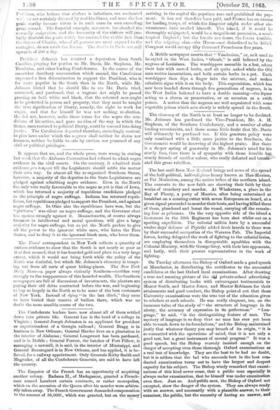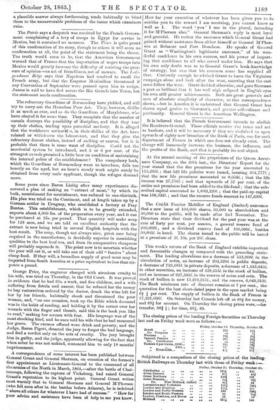On Tuesday afternoon the Bishop of Oxford made a good
speech at Manchester, in distributing the certificates to the successful candidates at the last Oxford local examinations. After drawing a true and amusing picture of the * private-school advertising system of distributing books with extravagant testimonials to Master Smith, and Master Jones, and Master Robinson for their attainments and good conduct, the Bishop pointed out that these University examinations were the true test of the education given to scholars at such schools. He was really eloquent, too, on the immense value of the study of" the structure of language in its nicety, the accuracy of expression in its perfectness." "Lan- guage," he said, "is the distinguishing feature of man. The mystery of language is so deep that no man has ever yet been able to reach down to its foundations," and the Bishop maintained justly that whatever theory you may broach of its origin, "it is so connected with the operations of *mind, that it is not only a good test, but a great instrument of mental progress." It was a good speech, but the Bishop scarcely insisted enough on the danger of accepting even these thorough Oxford examinations as a real test of knowledge. They are the best to be had no doubt, but it is seldom that the lad who succeeds best in the best con, ducted examination turns out to have the largest and deepest capacity for his subject. The Bishop wisely remarked that exami- nations of this kind never cease, that a public man especially is always under examination, that he himself was under examination even then. Just so. And public men, the Bishop of Oaford not excepted, show the danger of the system. They are always ready with an answer, and necessarily with a plausible answer, to their examiner, the public, but the necessity of having an answer, and
a plausible answer always forthcoming, tends habitually to blind them to the unanswerable problems of the issues which examiners raise.































 Previous page
Previous page